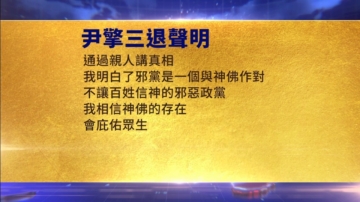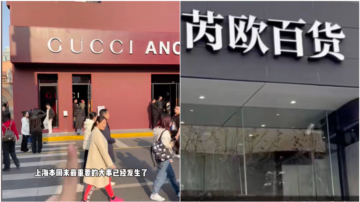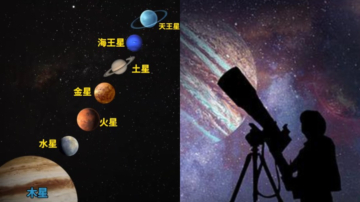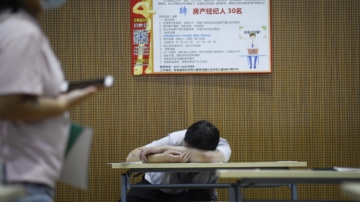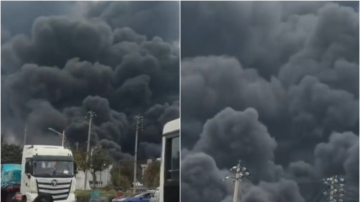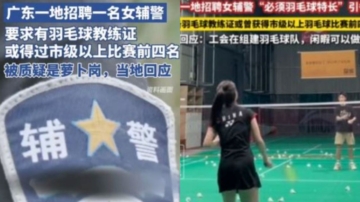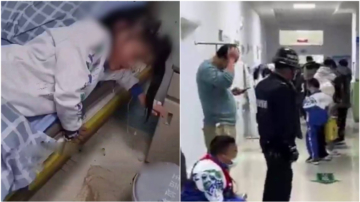【新唐人2013年11月26日訊】青島「11.22爆炸事件」發生後,當地媒體對於這起慘案的遲報、瞞報、謊報、冷處理等做法,遭到了全民譴責。但青島媒體人微博控訴,他們並非冷血,只是「手腳暫時被捆住」。同時,網路傳出青島當局限制記者進入醫院調查,青島媒體收到上級簡訊等消息。網民憤怒質問:背後下令的手,你對得起青島嗎?
據大陸媒體報導,從「中石化」青島輸油管線爆炸事故現場指揮部傳來消息說,截至24號13點,爆炸導致的死亡人數達到52人,失蹤11人。但顯然,大陸官媒公布的這一數字無法令百姓信服,人們仍然在私下裡打聽和猜測著死亡的真實人數。
有民眾披露,青島四大醫院的傷員爆滿。傷者家屬高小姐對外透露,和她親人同車拉到醫院的有5人,「目前僅生存一個,內部說死亡100多個了」。高小姐認為,死亡肯定不止幾十人,她見到和直接知道的就已經超過了官方報導的數字。
據香港《蘋果日報》24號報導,爆炸現場救援人員說:「後果已經遠遠超過我當初的想像」。各家醫院死亡人數不斷攀升,但當局已開始限制記者入內採訪。此外,網傳有青島媒體記者披露他們接到上級簡訊,並表示﹕內容不說大家都猜得出來。
究竟是甚麼力量在背後左右著青島當局和媒體? 憤怒的民眾質問:「背後下令的手,你對得起青島嗎?」
原《河北廣播電臺》編輯 朱欣欣:「它怕媒體親自到當地採訪的時候,爆料出更多的內幕或者是事件的真相,另外還有怕媒體把民眾真實的一些看法和想法與官方相矛盾的、相對立的一些觀點傳播出去。」
在此之前,青島媒體在爆炸事件中所表現的冷漠和麻木,早已激起了全民的憤慨,網路上罵聲一片。而最令青島人民無法接受的是,同樣的爆炸案,大陸各地媒體都給予了極大關注,不少地方都是頭版大篇幅報導,但青島當地的數家媒體的頭版卻只字未提。
美國《大紀元》新聞網報導,一位攝影師表示,他特意去青島本地報社門口看報紙,只看到頭版幾行小字是有關爆炸案的,諷刺的是,底板報導國外一家超市坍塌的新聞更加醒目,還配有照片。他圍著報欄轉了一圈,各版沒有一張黃島爆炸照片。
青島當地官報《半島都市報》甚至出現號召民眾搶購海參的廣告。網友為此創作了一首名為《搶海參》的歌曲諷刺媒體。
「爆炸事故導致原油流入大海,海參就要受到污染現在快去買,今冬最低價2980塊,吃著海參祈福心情沒有那麼壞,忘掉痛苦、忘掉悲傷,快去搶海參。」
在沸騰的民怨下,《半島都市報》直到24號才對爆炸案進行大篇幅報導,但整整九大版面卻佈滿了《官兵做飯 百姓喊香》《最佳醫護 最好救治》《水電氣已通,生活步入正軌》《住安置點 如家溫暖》之類粉飾太平、歌功頌德式的報導。於是,民眾再次憤怒了。
《新週刊》諷刺:「你眼睜睜的看著,一件喪事最後給辦成了一件喜事。」網民乾脆提議:換個標題吧,人民群眾「喜迎」管道爆炸!
朱欣欣:「它們就是想盡量把事情控制在它自己允許的範圍內,或者是它自己所定的這個報導的調子,它想怎麼樣,從哪個角度來報導這個事情,它要加以控制,往往是它根據它的需要搞了一個『標準』的文本,來對外公布。這裡面其實有很多很多的隱瞞,或者是扭曲。」
但是,面對著鋪天蓋地的罵聲,有青島媒體人在網上訴苦自辯,慘劇發生,當地媒體人也痛苦、無奈、委屈,但他們的「手腳暫時被捆住」了。對此,微博名為「郭敬明有話說」的網友反駁:專治下的體制,不是暫時的捆綁,是永久的奴役。
採訪/常春 編輯/張天宇 後製/陳建銘
Reporters Stopped From Investigating Qingdao Explosion
Local media in Qingdao have received condemnation
for late, false and cold reporting of the "11.22 explosion".
Qingdao media staff microblogged
that they are not cold-blooded.
Rather, their hands and feet were temporarily bound.
Internet reports suggest the Qingdao authorities
restricted reporters' investigations in the hospitals.
Qingdao media also reportedly received a brief
from higher level authorities, on what to report.
Netizens asked in anger whether the people
behind the order have a conscience for Qingdao?
Chinese state media reports state that up until
1pm on November 24, there were 52 people
confirmed dead, with a further 11 missing,
from the Qingdao Sinopec pipeline explosion.
Chinese people remain unconvinced about the official
figures, as they continue to investigate the real numbers.
Members of the public disclosed that the four big
hospitals in Qingdao were full of wounded people.
Miss Gao, a family member of an injured victim,
said there were 5 people hospitalized from her family.
Only one survived. Internally, it has been
reported that more than 100 people have died.
Miss Gao thinks there may be dozens of people
dead, and that the numbers exceed official reports,
based on what she has seen and learned directly.
A report in Hong Kong's Apple Daily newspaper on
November 24 contained interviews with rescue workers.
"It is far worse than I first imagined".
With rising death tolls in each hospital, the authorities
have started limiting reporter interviews in the hospitals.
Internet reports suggest that Qingdao journalists
received directives from higher level authorities.
It was said that everyone can
guess the content of the message.
Who is the force behind the control of
the Qingdao authorities and the media?
Netizens asked in anger whether the people
behind the order have a conscience for Qingdao?
Zhu Xinxin, former Hebei Radio editor: "They fear that onsite
media interviews may reveal more truths about the incident.
They also fear that the media will spread some real
public views, and opinions that oppose the official's."
Prior to this, Qingdao media's apparent apathy
towards the explosion sparked a national outrage,
with widespread condemnation over the internet.
Qingdao people found it unacceptable that the explosion
did not make local headline news, in comparison with other
Chinese media, in which the reports were headline news.
The Epoch Times reported a story from a photographer,
who went to read Qingdao local newspapers, and
only found a few lines of news about the explosion.
The report was in small print, on
the front page of a local newspaper.
News of the supermarket collapse in Latvia had made
headline news, with dominant photographs on the page.
He looked through the newspaper, and could
not find any photographs of the explosion.
Bandao Metropolis Daily, an official Qingdao
local newspaper, advertised cucumbers for sale.
Netizens created a song called "grab the cucumber"
to satirize the media reporting on the explosion.
"After the explosion, the crude oil leaks could
enter the sea, and contaminate the cucumbers.
Let's go to buy cucumbers now; the
lowest price for this winter is 2980 RMB.
We pray that eating cucumbers will make you forget the
pain, forget the sadness. Let's go buy cucumbers quickly."
Under pressure from public grievances, Bandao
Metropolis Daily reported on the explosion
with extensive coverage on November 24.
It covered nine pages of news, but readers
felt that some reports falsified the situation.
Reports included subjects such as; "soldiers cooking food,
civilians praise as tasty"; "the best nurses, the best rescuers";
"life goes back to normal, electricity and gas supply restored";
and "living in the rescue center is cozy, and just like home".
New Weekly satirized the reports, saying that "you can
tell that they finally made a funeral seem like a good thing."
Netizens suggested changing the title to;
"people celebrate pipeline explosion".
Zhu Xinxin: "They just try to force things
under their own control, or follow their voice.
They think it should be controlled on how to report
on the incident, and from which point of view to report.
They often engage in a standardized format
based on their needs on what to announce.
There is actually a lot of concealment or distortion."
Facing overwhelming condemnation, some people
from te Qingdao media defended their actions online.
They are suffering grievances and frustration,
because their hands are bound temporarily.
A micro-blog named "Guo Jingming has
retorted that it's not temporary binding, but
permanent slavery under a tyrannical system.
Interview/ChangChun Edit/ZhangTianyu Post-Production/ChenJianmin
據大陸媒體報導,從「中石化」青島輸油管線爆炸事故現場指揮部傳來消息說,截至24號13點,爆炸導致的死亡人數達到52人,失蹤11人。但顯然,大陸官媒公布的這一數字無法令百姓信服,人們仍然在私下裡打聽和猜測著死亡的真實人數。
有民眾披露,青島四大醫院的傷員爆滿。傷者家屬高小姐對外透露,和她親人同車拉到醫院的有5人,「目前僅生存一個,內部說死亡100多個了」。高小姐認為,死亡肯定不止幾十人,她見到和直接知道的就已經超過了官方報導的數字。
據香港《蘋果日報》24號報導,爆炸現場救援人員說:「後果已經遠遠超過我當初的想像」。各家醫院死亡人數不斷攀升,但當局已開始限制記者入內採訪。此外,網傳有青島媒體記者披露他們接到上級簡訊,並表示﹕內容不說大家都猜得出來。
究竟是甚麼力量在背後左右著青島當局和媒體? 憤怒的民眾質問:「背後下令的手,你對得起青島嗎?」
原《河北廣播電臺》編輯 朱欣欣:「它怕媒體親自到當地採訪的時候,爆料出更多的內幕或者是事件的真相,另外還有怕媒體把民眾真實的一些看法和想法與官方相矛盾的、相對立的一些觀點傳播出去。」
在此之前,青島媒體在爆炸事件中所表現的冷漠和麻木,早已激起了全民的憤慨,網路上罵聲一片。而最令青島人民無法接受的是,同樣的爆炸案,大陸各地媒體都給予了極大關注,不少地方都是頭版大篇幅報導,但青島當地的數家媒體的頭版卻只字未提。
美國《大紀元》新聞網報導,一位攝影師表示,他特意去青島本地報社門口看報紙,只看到頭版幾行小字是有關爆炸案的,諷刺的是,底板報導國外一家超市坍塌的新聞更加醒目,還配有照片。他圍著報欄轉了一圈,各版沒有一張黃島爆炸照片。
青島當地官報《半島都市報》甚至出現號召民眾搶購海參的廣告。網友為此創作了一首名為《搶海參》的歌曲諷刺媒體。
「爆炸事故導致原油流入大海,海參就要受到污染現在快去買,今冬最低價2980塊,吃著海參祈福心情沒有那麼壞,忘掉痛苦、忘掉悲傷,快去搶海參。」
在沸騰的民怨下,《半島都市報》直到24號才對爆炸案進行大篇幅報導,但整整九大版面卻佈滿了《官兵做飯 百姓喊香》《最佳醫護 最好救治》《水電氣已通,生活步入正軌》《住安置點 如家溫暖》之類粉飾太平、歌功頌德式的報導。於是,民眾再次憤怒了。
《新週刊》諷刺:「你眼睜睜的看著,一件喪事最後給辦成了一件喜事。」網民乾脆提議:換個標題吧,人民群眾「喜迎」管道爆炸!
朱欣欣:「它們就是想盡量把事情控制在它自己允許的範圍內,或者是它自己所定的這個報導的調子,它想怎麼樣,從哪個角度來報導這個事情,它要加以控制,往往是它根據它的需要搞了一個『標準』的文本,來對外公布。這裡面其實有很多很多的隱瞞,或者是扭曲。」
但是,面對著鋪天蓋地的罵聲,有青島媒體人在網上訴苦自辯,慘劇發生,當地媒體人也痛苦、無奈、委屈,但他們的「手腳暫時被捆住」了。對此,微博名為「郭敬明有話說」的網友反駁:專治下的體制,不是暫時的捆綁,是永久的奴役。
採訪/常春 編輯/張天宇 後製/陳建銘
Reporters Stopped From Investigating Qingdao Explosion
Local media in Qingdao have received condemnation
for late, false and cold reporting of the "11.22 explosion".
Qingdao media staff microblogged
that they are not cold-blooded.
Rather, their hands and feet were temporarily bound.
Internet reports suggest the Qingdao authorities
restricted reporters' investigations in the hospitals.
Qingdao media also reportedly received a brief
from higher level authorities, on what to report.
Netizens asked in anger whether the people
behind the order have a conscience for Qingdao?
Chinese state media reports state that up until
1pm on November 24, there were 52 people
confirmed dead, with a further 11 missing,
from the Qingdao Sinopec pipeline explosion.
Chinese people remain unconvinced about the official
figures, as they continue to investigate the real numbers.
Members of the public disclosed that the four big
hospitals in Qingdao were full of wounded people.
Miss Gao, a family member of an injured victim,
said there were 5 people hospitalized from her family.
Only one survived. Internally, it has been
reported that more than 100 people have died.
Miss Gao thinks there may be dozens of people
dead, and that the numbers exceed official reports,
based on what she has seen and learned directly.
A report in Hong Kong's Apple Daily newspaper on
November 24 contained interviews with rescue workers.
"It is far worse than I first imagined".
With rising death tolls in each hospital, the authorities
have started limiting reporter interviews in the hospitals.
Internet reports suggest that Qingdao journalists
received directives from higher level authorities.
It was said that everyone can
guess the content of the message.
Who is the force behind the control of
the Qingdao authorities and the media?
Netizens asked in anger whether the people
behind the order have a conscience for Qingdao?
Zhu Xinxin, former Hebei Radio editor: "They fear that onsite
media interviews may reveal more truths about the incident.
They also fear that the media will spread some real
public views, and opinions that oppose the official's."
Prior to this, Qingdao media's apparent apathy
towards the explosion sparked a national outrage,
with widespread condemnation over the internet.
Qingdao people found it unacceptable that the explosion
did not make local headline news, in comparison with other
Chinese media, in which the reports were headline news.
The Epoch Times reported a story from a photographer,
who went to read Qingdao local newspapers, and
only found a few lines of news about the explosion.
The report was in small print, on
the front page of a local newspaper.
News of the supermarket collapse in Latvia had made
headline news, with dominant photographs on the page.
He looked through the newspaper, and could
not find any photographs of the explosion.
Bandao Metropolis Daily, an official Qingdao
local newspaper, advertised cucumbers for sale.
Netizens created a song called "grab the cucumber"
to satirize the media reporting on the explosion.
"After the explosion, the crude oil leaks could
enter the sea, and contaminate the cucumbers.
Let's go to buy cucumbers now; the
lowest price for this winter is 2980 RMB.
We pray that eating cucumbers will make you forget the
pain, forget the sadness. Let's go buy cucumbers quickly."
Under pressure from public grievances, Bandao
Metropolis Daily reported on the explosion
with extensive coverage on November 24.
It covered nine pages of news, but readers
felt that some reports falsified the situation.
Reports included subjects such as; "soldiers cooking food,
civilians praise as tasty"; "the best nurses, the best rescuers";
"life goes back to normal, electricity and gas supply restored";
and "living in the rescue center is cozy, and just like home".
New Weekly satirized the reports, saying that "you can
tell that they finally made a funeral seem like a good thing."
Netizens suggested changing the title to;
"people celebrate pipeline explosion".
Zhu Xinxin: "They just try to force things
under their own control, or follow their voice.
They think it should be controlled on how to report
on the incident, and from which point of view to report.
They often engage in a standardized format
based on their needs on what to announce.
There is actually a lot of concealment or distortion."
Facing overwhelming condemnation, some people
from te Qingdao media defended their actions online.
They are suffering grievances and frustration,
because their hands are bound temporarily.
A micro-blog named "Guo Jingming has
retorted that it's not temporary binding, but
permanent slavery under a tyrannical system.
Interview/ChangChun Edit/ZhangTianyu Post-Production/ChenJianmin

